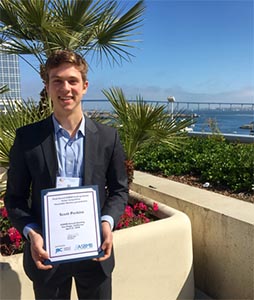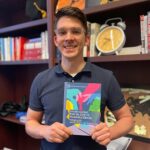
Wooster Sophomore Honored for Research Presentation at National Conference

WOOSTER, Ohio – Scott Perkins, a sophomore neuroscience major from Wooster, Ohio, was honored for the quality of his research presentation at the American Society for Biochemistry and Molecular Biology’s annual meeting in San Diego, Cal., in April. More than 250 undergraduates presented posters on their research and 20 were singled out for special recognition. Perkins received one of four honorable mention awards in the bioenergetics and metabolism category.
Perkins presented his findings from a research project he is working on with Mark Snider, the Robert E. Wilson Professor of Chemistry at Wooster, and Kent Nakamoto, a senior chemistry major from Orange, Ohio. The project focuses on determining the mechanism of a novel enzyme that plays a key role in the bacterial degradation of environmental contaminants, work that ultimately will allow scientists to bioengineer bacteria to assist in bioremediation processes. Nakamoto, who made a separate presentation at the conference, has worked with Snider for four years, and his senior Independent Study project is built around their work together.
“For Scott to be recognized at this level for being among the best undergraduate researchers in the country, especially at this early stage in his career, is a significant achievement,” Snider said. “He has been a dedicated member of my lab over the past two years, and this honor is well deserved.”
“Dr. Snider always pushes me to do my best work,” said Perkins. “He doesn’t hesitate to give me challenging assignments or push me intellectually, but is also very supportive and always willing to help if I need it. Because of his mentorship, I’ve grown as a scientific thinker, researcher, and communicator. I’ve also had a lot of fun and have loved the opportunity to do exciting research with cutting-edge technology. We have worked very hard on this project for the past 18 months, so it’s gratifying to be recognized!”
Eight students in all travelled to San Diego for the conference, accompanied by Snider and Dean Fraga, the Danforth Professor of Biology. “The ASBMB meeting affords our students the opportunity to present their work and showcase all that Wooster has to offer with regard to mentored undergraduate research,” Fraga said. “I was particularly happy with how engaged the students were with the featured talks, often bringing back wonderful synopses of lectures they found particularly exciting.”
Lindsay Fannin, a senior biochemistry and molecular biology major from Lexington, Ohio, whose senior I.S. was mentored by Fraga, presented a characterization of bacterial arginine kinases, an enzyme family that is used in energy metabolism.
Sydney Fine, also a senior biochemistry and molecular biology major, from Maple Grove, Minn., presented on her I.S. research into the degradation of nicotinic acid and nicotine by Bacillus niacin, a common soil bacterium. Snider is the faculty mentor for her project.
Another of Snider’s I.S. advisees, Nathan Brownstein, a senior biochemistry and molecular biology major from Bethany, Conn., prepared a poster on engineering expression systems for functional studies of a newly identified multi-subunit enzyme complex thought to be involved in degrading contaminants in the environment.
Andrew Delaat, a junior biochemistry and molecular biology major from Medina, Ohio, presented on a yearlong research study he is engaged in with Peter Piermarini, associate professor of entomology at the Ohio Agricultural Research and Development Center (OARDC) in Wooster. The study examines the insecticidal effects of natural products on mosquitoes that carry the Zika virus, in order to identify novel therapies.
Kaeli Zoretich, a junior biochemistry and molecular biology major from Uniontown, Ohio, presented the results of her sophomore research project, conducted in Snider’s lab, investigating a novel gene hypothesized to be part of a unique nicotinic acid degradation pathway from a common soil bacterium.
Madigan Strange, a junior biochemistry and molecular biology major from Forrest, Ind., also presented her sophomore research project, part of a long-term study being conducted in Fraga’s lab, which aimed to determine the role of calcineurin genes in the swimming behavior of paramecium.
Perkins is the fifth Wooster student from Snider’s lab to win honorable mention at the ASBMB National Undergraduate Poster Competition in the past eight years. The others are Virginia Kincaid ’10 (Chemistry) who went on to receive her Ph.D. in biochemistry from the University of Wisconsin; Brad Palanski ’11 (BCMB) who will soon complete a Ph.D. in chemistry at Stanford University; Manish Aryal ‘14 (BCMB), currently a Ph.D. student in molecular biophysics and structural biology at the University of Pittsburgh; and Zachary Harvey ’14 (Chemistry) who is currently a Ph.D. student in chemical & systems biology at Stanford University.
The College of Wooster is America’s premier college for mentored undergraduate research. By working one-on-one with a faculty adviser to conceive, organize, and complete an original research project, written work, performance or art exhibit, every Wooster student develops independent judgment, analytical ability, creativity, project-management and time-management skills, and strong written and oral communication skills. Founded in 1866, the college enrolls approximately 2,000 students.
Posted in News on April 30, 2018.
Related Posts
Related Areas of Study
Neuroscience
Psychology, chemistry, philosophy, computer science, and other disciplines combine in the study of the nervous system
MajorChemistry
Access to labs, research opportunities, and small classes give chemistry majors lots of options after graduation.
Major MinorBiology
Explore molecular and cellular biology, ecology and more with top faculty and access to extensive lab facilities.
Major Minor

